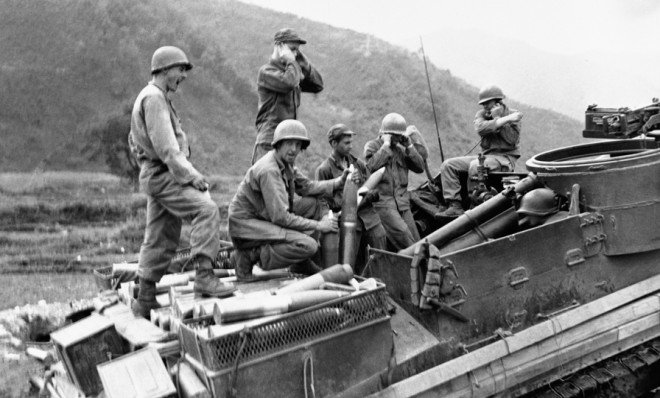Does the U.N. ever actually go to war?
Yes. In fact, it's waging one right now.

A free daily email with the biggest news stories of the day – and the best features from TheWeek.com
You are now subscribed
Your newsletter sign-up was successful
According to the international community's obscure, often-ignored rules of war, countries are — broadly — only supposed to attack one another in self-defense, when they themselves have come under attack. Any other threat or use of force requires the approval of the United Nations Security Council.
In reality, of course, that idea is almost laughable. Few countries bother getting U.N. approval before they start launching missiles or firing bullets, and President Obama has made it clear that he's willing to bypass the U.N. when it comes to the conflict of the moment, in Syria. After all, securing a U.N. resolution for military action requires a unanimous vote from veto-wielding members on the Council, or for those countries to at least abstain if they disapprove. And how often are rival powerhouses like America, Russia, and China ever going to be in harmony when it comes to war?
So you'd be forgiven for thinking that the U.N. is pretty useless at sanctioning attacks. But actually, you'd be wrong. Since World War II, the organization has approved and provided soldiers for a whole range of conflicts. A brief history:
The Week
Escape your echo chamber. Get the facts behind the news, plus analysis from multiple perspectives.

Sign up for The Week's Free Newsletters
From our morning news briefing to a weekly Good News Newsletter, get the best of The Week delivered directly to your inbox.
From our morning news briefing to a weekly Good News Newsletter, get the best of The Week delivered directly to your inbox.
The Korean War
Force was authorized to "reverse or repel aggression by one State against another," as the U.N. charter puts it. In Korea's case, that aggressor came in 1950 from the North, when the Democratic People's Republic of Korea (now known as North Korea) invaded the Republic of Korea (now South Korea). Conveniently for South Korea and its allies, the Soviet Union — which along with China came down on the side of the North — decided to boycott the U.N. Security Council, paving the way for Resolution 84 and the Korean War of 1950-1953.
The Gulf War
In 1990, Saddam Hussein provoked the U.N. into authorizing another major conflict when he invaded and annexed Kuwait. The Council passed Resolution 678, and one day later a U.S.-led international coalition launched Operation Desert Storm. But Hussein would stay put until the second Iraq War in 2003 — an attack famously not approved by the U.N.
A free daily email with the biggest news stories of the day – and the best features from TheWeek.com
"Peacekeeping missions"
The main other justification the U.N. gives for using force against member states is through its paradoxically named "peacekeeping missions." The organization has authorized force to keep the peace in a whole range of countries, including the former Yugoslavia, Haiti, Rwanda, Somalia, and Kosovo. Its success at "keeping the peace" in these countries is, of course, arguable.
The Libyan no-fly zone
In one of the few modern examples of diplomatic consensus, the Security Council voted in 2011 to authorize "all necessary measures" to protect civilians in Libya, especially those in Benghazi who were apparently under the threat of impending massacre. That's not to say that Russia approved the resolution; they, along with China and three others, abstained. But a no-fly zone was set up, vast swathes of the country were bombed, and Libyan leader Moammar Gadhafi was eventually caught and killed with a bayonet to the back and a bullet to the head.
The U.N.'s first real war
In June, the U.N. quietly started waging its own war in the Democratic Republic of Congo. Though having authorized other wars and provided soldiers to help in these fights, the U.N.'s deployment of 3,000 troops to fight Congolese rebels terrorizing vast stretches of the country is the first time in the organization's history that it will go on the attack, and be in direct control of the soldiers, the tactics on the ground, and air strikes. The deployments were sanctioned in a rare unanimous vote.
Apparently the U.N. does favor military action then, in the right circumstances. Who knew it could be so aggressive?
Frances Weaver is a senior editor at The Week magazine. Originally from the U.K., she has written for the Daily Telegraph, The Spectator and Standpoint magazine.
-
 What is the endgame in the DHS shutdown?
What is the endgame in the DHS shutdown?Today’s Big Question Democrats want to rein in ICE’s immigration crackdown
-
 ‘Poor time management isn’t just an inconvenience’
‘Poor time management isn’t just an inconvenience’Instant Opinion Opinion, comment and editorials of the day
-
 Bad Bunny’s Super Bowl: A win for unity
Bad Bunny’s Super Bowl: A win for unityFeature The global superstar's halftime show was a celebration for everyone to enjoy